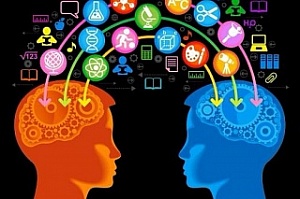Scientists at the Department of Human and Animal Physiology at TSU’s Biological Institute are studying the activity of a mirror neuron system that operates when people perceive short intervals of time. The function performed by mirror neurons in cognitive processes is not fully understood and is the subject of scientific disputes. They may well play an important role in learning and emotional behavior. The studies are being conducted with the group for neuroimaging of cognitive functions at the National Research Center Kurchatov Institute.
Mirror neurons of the brain were first found in macaques. Now it is reliably known that nerve cells of this type are found in primates, humans, and some birds. A feature of mirror neurons is that they are excited both in the performance of a certain action and in monitoring it.
- According to the available data, mirror neurons play a very important role in predicting intentions, in communicative processes, and in learning and empathy, but the functions of these cells have not been adequately studied, - says Yury Bushov, head of the Department of Human and Animal Physiology. - In particular, there is no data on how mirror neurons operate in time perception processes, how the structural and functional organization of the mirror neuron system depends on the person's sex, or how it works for right-handed and left-handed people.
Scientists at TSU and the Kurchatov Institute intend to fill this gap. Volunteers that are students of TSU and Moscow universities will participate in the experiments. In 2018, young people will be involved in the experiments; in 2019, it will be females. They will try to reproduce a given rhythm and measure short time intervals using the computer program Hronos, developed by physiologists of the Biological Institute, which automatically processes results.
The activity and spatial localization of mirror neurons will be studied through an electroencephalography recording, evaluating the mu-rhythm that is suppressed when observing or performing actions. ,A tomographic study of brain activity in various modes of perception of time will be performed at the Kurchatov Institute to more accurately localize mirror neurons.
- We will study the activity of the mirror neuron system not only when it is observing and performing actions related to the perception of time, but also in the mental reproduction of the same actions, – says Yury Bushov.
As the head of the Department of Human and Animal Physiology notes, the findings are important primarily for understanding the social behavior of animals and humans. Scientists are considering future study of the relationship of the mirror neuron system with abnormalities in cognitive functions.
According to Yury Bushov, physiologists are interested in the connection of the activities of mirror neurons with, for example, autism. There is a point of view that its cause is a disruption in the functioning of the cerebral spinal cord, which leads to a lack of empathy and other concomitant symptoms of this disorder. Therefore, it can not be ruled out that clarifying the role of the mirror neuron system in cognitive processes will contribute to solving such pressing problems as autism.

